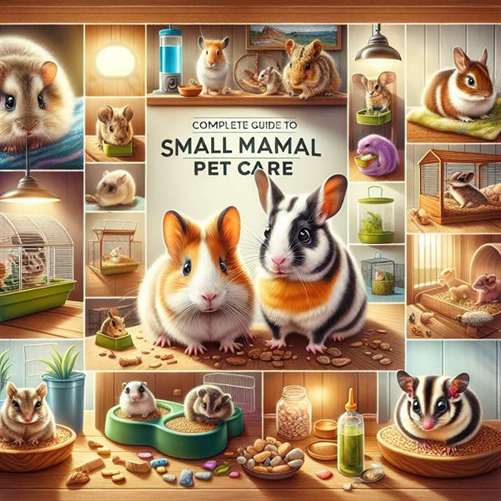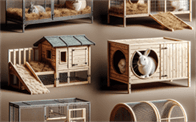Complete Guide to Small Mammal Pet Care
Introduction
Small mammal pet care is an essential topic for anyone considering adding a small pet to their family. These adorable creatures, including hamsters, gerbils, rabbits, and guinea pigs, have unique needs that require special attention and knowledge. As more people turn to small mammals as companions, understanding how to care for them has become increasingly important. Recent studies have shown that owning a small mammal can provide emotional benefits, making them a popular choice among families and individuals alike.
In this guide, we will explore the various aspects of small mammal pet care, including their dietary needs, habitat requirements, and social behaviors. You’ll learn the essential tips for providing a healthy and happy environment for your small furry friends. Additionally, we will delve into the importance of regular veterinary check-ups and proper handling techniques to ensure your pet’s well-being.
The significance of small mammal pet care goes beyond just meeting their basic needs; it’s about fostering a loving relationship that enriches both your life and that of your pet. By the end of this article, you will have a comprehensive understanding of how to provide the best care possible.
For a deeper dive into effective pet care strategies, consider exploring our guide on setting up the perfect habitat for small pets.
What is Small Mammal Pet Care?
Definition
Small mammal pet care refers to the practices and knowledge required to properly care for small pet mammals. This includes providing appropriate housing, nutrition, enrichment, and health monitoring for pets like rabbits, hamsters, and ferrets. These animals, while relatively low-maintenance compared to dogs or cats, require a thoughtfully designed environment and tailored care routines.
Historical Context
The history of small mammal pet care dates back to the domestication of rabbits and guinea pigs in ancient societies. Rabbits were originally bred for their meat and fur, while guinea pigs were domesticated by the Incas for similar purposes. Over the years, the popularity of these small animals has surged, leading to advancements in pet care practices and products that cater specifically to their needs.
As pet ownership has evolved, so too has our understanding of the requirements for keeping these small mammals healthy and happy. Today, pet owners have access to a wealth of information and resources to support their small mammal care journey.
The Importance of Small Mammal Pet Care
As more people adopt small mammals, understanding their specific care requirements has become crucial. Factors driving this trend include the growing awareness of the emotional benefits of pet ownership and the increasing availability of resources tailored to small mammals.
Small mammal pet care not only involves feeding and housing but also encompasses understanding their behavior, social needs, and health issues. By prioritizing their well-being, owners can ensure these pets thrive and develop positive relationships with their families. For more insights on choosing the right small mammal for your household, check our guide on best small mammal pets for your home.

Understanding Small Mammal Needs
Dietary Requirements
Nutrition is a cornerstone of small mammal pet care. Each species has different dietary needs, so it’s essential to provide a balanced diet tailored to your pet’s requirements.
- Rabbits: Require high-fiber diets consisting of hay, fresh vegetables, and a limited amount of pellets.
- Guinea pigs: Need vitamin C-rich foods, including fresh fruits and vegetables, alongside hay and pellets.
- Hamsters: Thrive on a mix of commercial pellets, fresh veggies, and occasional treats such as seeds or nuts.
- Gerbils: Prefer a diet of pellets, seeds, and occasional fresh produce.
For an in-depth look at what to feed your pet, visit our article on what small mammal pet food you should buy.
Habitat Requirements
Creating an appropriate habitat is crucial for the well-being of your small mammal. Each species has specific needs regarding space, bedding, and enrichment.
- Cages: Ensure the cage is spacious enough to allow movement and exploration. For example, hamster cages for small pets should be multi-level with tunnels and hiding spots.
- Bedding: Use safe, absorbent bedding materials like aspen shavings or paper-based products to keep the cage clean and comfortable.
- Enrichment: Provide toys, tunnels, and chew items to stimulate your pet’s mind and prevent boredom.
Social Needs
Small mammal pet care extends beyond their physical needs; understanding their social behaviors is vital too. Many small mammals are social creatures that thrive on interaction.
- Rabbits: Often enjoy the company of other rabbits and can benefit from bonding with a companion.
- Guinea pigs: Are highly social and should be housed in pairs or groups to prevent loneliness.
- Hamsters: Typically prefer solitary housing, though some species can coexist peacefully.
It’s important to observe your pet’s behavior and adjust their social environment as needed. If you’re new to this aspect of care, check out our guide on socializing small pet mammals.
Essential Care Tips for Small Mammals
Regular Health Monitoring
Routine health monitoring is crucial in small mammal pet care. Regular vet visits can catch health issues early, ensuring your pet remains healthy.
- Weight checks: Monitor your pet’s weight consistently to catch any sudden changes.
- Behavioral observations: Keep an eye on your pet’s behavior. Changes in eating habits, activity levels, or grooming can signal health problems.
- Dental care: Many small mammals, especially rabbits and guinea pigs, require regular dental checks to prevent overgrowth of teeth.
Additionally, ensure your pet is up-to-date on vaccinations and preventive care. For specific health advice tailored to your pet, explore our article on how to improve small mammal pet health.
Grooming Practices
Grooming is an important aspect of small mammal pet care. Regular grooming helps maintain your pet’s hygiene and promotes bonding.
- Rabbits: Require regular brushing to manage shedding and reduce fur ingestion.
- Guinea pigs: Benefit from occasional baths and consistent brushing to keep their coats healthy.
- Hamsters: Generally self-groom, but you can help by providing sand baths for their fur.
For more detailed grooming tips, visit our comprehensive guide on small mammal pet grooming tips and tricks.
Handling and Bonding
Proper handling techniques are crucial for building trust and ensuring your small mammal feels safe and secure.
- Gentle approach: Always approach your pet calmly and avoid sudden movements that might scare them.
- Support their body: When picking up your pet, support their body fully to prevent injury.
- Regular interaction: Spend time daily interacting with your pet to strengthen your bond and enhance their socialization.
Understanding your pet’s personality will help you tailor your interactions and care practices. For a better understanding of how to handle your pet, consult our guide on pet ferret behavior.
Future Trends in Small Mammal Pet Care
Innovations in Pet Products
The pet care industry is rapidly evolving, with new products designed specifically for small mammals. From advanced habitats to specialized diets, the choices available today are more diverse than ever.
- Smart cages: Some companies are developing cages equipped with technology to monitor your pet’s health and environment.
- Customized diets: Many brands are now offering specialized food formulations that cater to the unique nutritional needs of various small mammals.
Increased Awareness and Education
As the popularity of small mammal pet care grows, so does the demand for education and resources. Pet owners are becoming more knowledgeable about their pets’ needs, leading to better care practices.
- Online communities: Forums and social media groups are providing platforms for owners to share experiences and advice.
- Workshops and webinars: Many organizations are hosting educational events to help pet owners learn more about caring for small mammals.
For further information on popular small mammal pets, check out our article on most popular small mammal pets to own.
Conclusion
Small mammal pet care is a rewarding journey that requires knowledge, commitment, and love. By understanding the unique needs of your pet, creating a comfortable habitat, and providing proper nutrition and social interaction, you can ensure a happy and healthy life for your small mammal companion.
Investing time in learning about their dietary requirements, habitat needs, and social behaviors will not only enhance your pet’s quality of life but also deepen the bond you share. Remember, the goal of small mammal pet care is not just to meet basic needs but to foster a loving relationship that enriches both your life and that of your
Resource Links:
- latchkeypets.com: … Our team of experienced sitters is ready to provide loving, personalized small animal pet care for your rabbits, rats, hamsters, guinea pigs, and other small …
- wildenrichment.com: People that move quickly, are loud, are nervous and try to pet an animal right away are likely not going to last long in any sort of animal care job. In …
- oxbowanimalhealth.com: … Explore pet care guides and pet care sheets from Oxbow! Get comprehensive care instructions for rabbits, guinea pigs, chinchillas, and more.




0 Comments